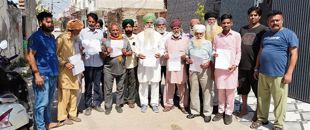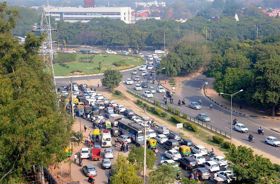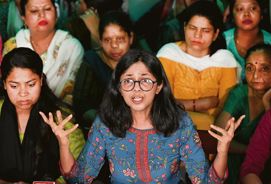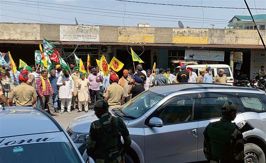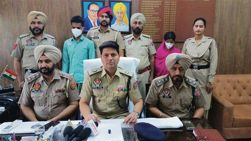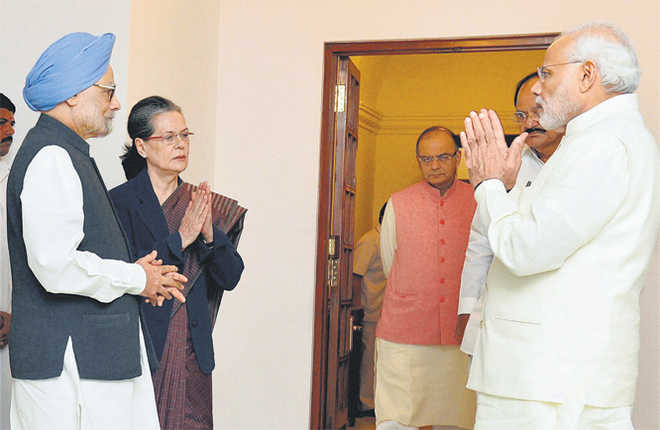
Prime Minister Narendra Modi at a meeting with Congress President Sonia Gandhi and former PM Manmohan Singh to break the impasse and help to pass the GST Bill. A mellower Modi gave the example of Nehru reaching out to staunch critic Lohia. PTI
T.V Rajeswar
The next Lok Sabha elections in 2019 may become a landmark in the history of the country. The BJP was at an unassailable position in the Lok Sabha, with 282 seats out of 543. However, the more-than-comfortable position of the BJP in the Lok Sabha has been eroded since 2014. The first setback that the BJP encountered was in the Delhi Assembly elections, in which Prime Minister Narendra Modi had himself propped up Kiran Bedi as the prospective Chief Minister and set up roadshows in Delhi. However, the Aam Admi Party was able to defeat the BJP, winning the Delhi elections with 67 seats out of 70 seats, with Arvind Kejriwal becoming the Chief Minister.
The BJP's fortune went down further in the Bihar Assembly elections, which became an important electoral battle between the BJP and the Nitish-Lalu combine. Nitish came out with a slogan: Bihari or Bahari. Bahari indicated that Narendra Modi was an outsider meddling in the affairs of Bihar. The stunning victory of the Nitish-Lalu combination in Bihar clearly indicated that the BJP's influence was disappearing fast. The outcome of the Bihar elections marked a watershed in the political history of the country. The Bihar electoral results led to the BJP facing a humiliating defeat and it resulted in Narendra Modi apparently becoming a changed man.
The Parliament was debating the Goods and Services Tax (GST) Bill, which is an important legislative measure for the country's economy. The Bihar defeat had sobered up the BJP to the extent that it began seeking the support and cooperation of the Congress Party with a fair amount of humility.
The Prime Minister held a meeting which was attended by Sonia Gandhi and Manmohan Singh, representing the Congress Party. From the BJP's side, it was attended by, apart from Prime Minister Narendra Modi, the Finance Minister Arun Jaitley and Parliamentary Affairs Minister Venkaiah Naidu. As the debate on the GST bill progressed, the BJP represented by Commerce Minister Nirmala Sitharaman, Finance Minister Arun Jaitley and Parliamentary Affairs Minister Venkaiah Naidu stressed on a compromise formula by reducing the tax rates as demanded by Congress and other opposition parties, especially from the states of Maharashtra, Tamil Nadu and Gujarat, which are the large manufacturing states. These states have to deal with GST rates, which were 18 per cent when the Bill was introduced. The BJP compromised by meeting the demands of the manufacturing states held by opposition parties to a reasonable extent.
At the Parliamentary level, members of the Opposition noticed a remarkable change in the attitude of Prime Minister Modi as well as his ministers. An analyst said that soon after the BJP came to power in May 2014, Modi paid obeisance to RSS leaders, such as Deendayal Upadhyaya and behaved more like an RSS pracharak than a Prime Minister. This change was reflected after the Bihar setback. Modi's speech in Rajya Sabha on the issue of intolerance largely on the part of the BJP was quite interesting. He said that there cannot be any doubt on the patriotism of 125 crore people. There is no need for anyone to prove their patriotism day and night. People like Yogi Adityanath and Sakshi Maharaj and other rabble-rousers of the BJP have been asked to keep quiet.
Again, Modi projected himself in the image of a leader honouring all major religions, notwithstanding the fact that he is a Hindu with an RSS background. During his visit to Kazakhstan in July 2015, Modi spoke at Astana, referring to the “Islamic heritage” of both India and Central Asia as being defined by the highest ideals of Islam, that is, knowledge, piety, compassion and welfare, “which had always rejected the forces of extremism”. During the debate on intolerance in Parliament, Modi said that Pandit Jawaharlal Nehru had demonstrated statesmanship and wisdom when he addressed Ram Manohar Lohia, who was known to be a stern critic of the Nehru family. Jawalarlal Nehru told Ram Manohar Lohia that as often pointed out by the latter, he had indeed committed some mistakes in his political career and he had no qualms in saying so.
At a different level, the non-BJP parties like the Samajwadi Party and the Bahujan Samaj Party are also getting ready to assert themselves in the forthcoming elections. Speaking in Lucknow recently, the young Chief Minister, Akhilesh Yadav said that all the parties, other than the BJP should combine to bring about the defeat of the Modi Government in the 2019 Lok Sabha elections. This would be possible if all the opposition parties combine and elect Mulayam Singh Yadav, who is called Netaji by his partymen. Mulayam Singh Yadav's hold on the Samajwadi Party and on large sections of the Muslim community is well known.
The Trinamool Congress in West Bengal also most likely supports the prospects of a non-BJP Government emerging at the Centre. Even the Congress party cannot be written off completely. In the Bihar Assembly elections, the Congress secured 27 seats, which was quite creditable. The Congress party has a fair amount of following in the Southern states. To revert to Akhilesh Yadav propping up his father Mulayam Singh Yadav, Akhilesh said that if his father Mulayam Singh Yadav was elected the Prime Minister, they would all vote for Rahul Gandhi as the Deputy Prime Minister.
Both the options are quite possible seeing the way electoral politics in the northern states has shaped in the recent months. In the North-East, particularly in Assam, the AGP and the Congress which contested against each other in the previous elections, are now reviewing their stance. Indications are that the AGP and the Congress may join hands and put up a united front against the BJP.
The writer is a former Governor of West Bengal and Uttar Pradesh.





















